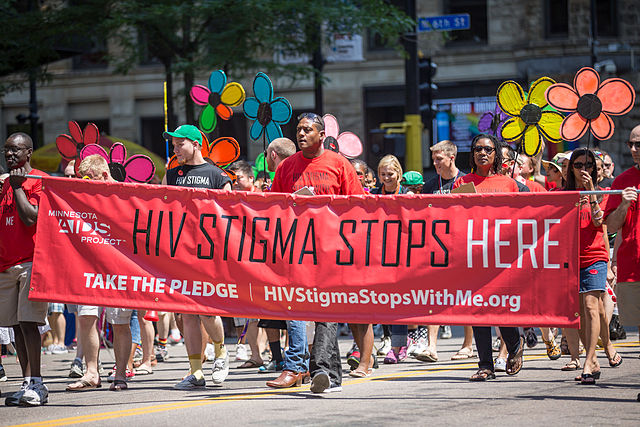5.5 HIV/AIDS

One of the more recent and devastating pandemics/epidemics is HIV/AIDS. HIV infection has led to the death of over 36 million people since the late 20th century (Columbia Public Health, 2021; WHO, n.d.-a) with over 37 million people living with HIV at the end of 2020 (WHO, n.d.-a). The origin of HIV/AIDs infection in humans is linked to a chimpanzee version of the virus (Simian Immunodeficiency Virus – SIV). It is believed that the virus was transmitted via blood contact to humans as far back as the late 1800s, likely through hunting chimpanzees. Since that time, it spread across Africa and to other parts of the world (CDC, n.d.).
The first human illnesses associated with HIV that made the headlines began to appear in 1981 in the gay male population of New York and San Francisco (Basic Facts, n.d.). The societal prejudice against the gay community at the time, led to stigmatization, discrimination, and a backlash against the gay community and the gay rights movement (Florcencio, 2018; Lewis, 1994). There was a general apathy on the part of governments towards people infected with the virus, which impacted research funding (Florcencio, 2018; Krieger, 1988). As a result, most efforts to help people living and dying with the virus were community-based (Lewis & Fraser, 1996).
In the late 1990s medication was developed that now allows people with the disease to experience a normal life span with regular treatment (Columbia Public Health, 2021). Although the medication doesn’t cure HIV/AIDS, and has many side effects, it does prevent the virus from multiplying and destroying a person’s immune system (simpleshowfoundation, 2014; WHO, n.d.-c). However, access to this life-saving medication remains a problem for people living in certain areas of the world, such as sub-Sahara Africa (simpleshowfoundation, 2014; WHO, n.d.-c).
Click the link below to learn more about HIV/AIDS:
Why the HIV Epidemic is Not Over
VIDEO: HIV/AIDS Video from Columbia Public Health
In the following video Wafaa El-Sadr (Chair of Global Health for the Dr. Mathilde Krim-amfAR, Director of ICAP and University Professor of Epidemiology and Medicine) talks about the importance of dealing with both the disease itself, as well as the societal implications of HIV/AIDS.

